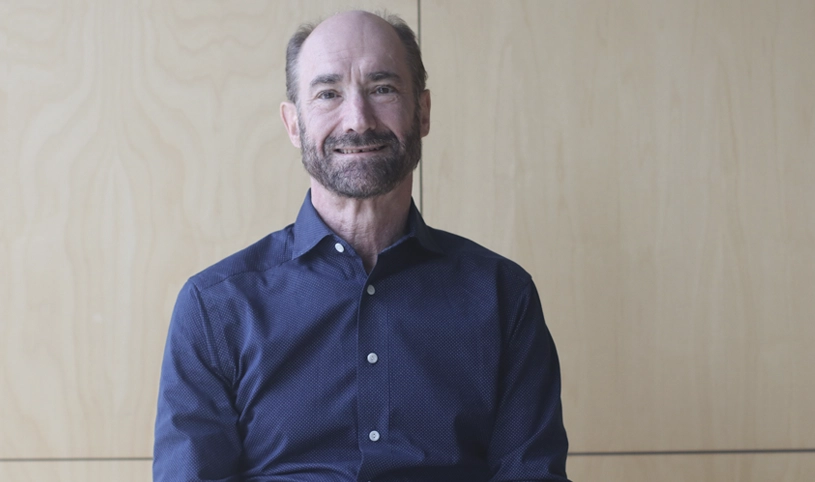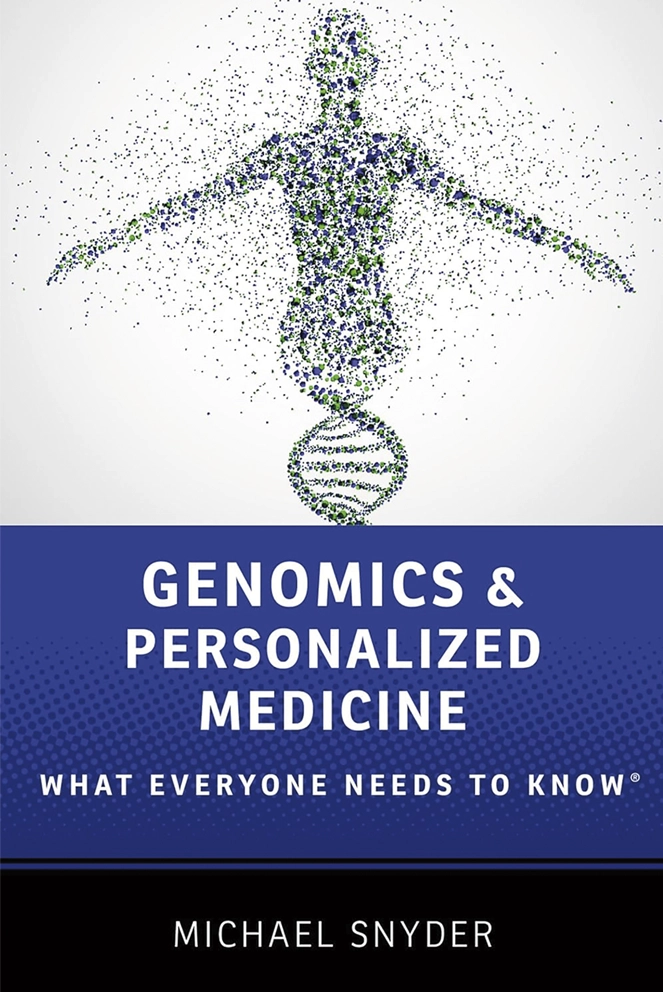Michael P. Snyder: "The benefits of sharing data outstrip the possible harm"
Stanford W. Ascherman Professor of Genetics, Chair of the Genetics Department and Director of the Centre for Genomics and Personalized Medicine at Stanford

Michael P Snyder is Stanford W. Ascherman Professor of Genetics, Chair of the Genetics Department and Director of the Centre for Genomics and Personalized Medicine at Stanford. His laboratory develops and uses diverse omics techniques such as genome sequencing, transcriptomics, proteomics, metabolomics, DNA methylation and microbiome assays to study complex systems. They are pioneers in the use of multi-omic longitudinal profiling to track health and detect presymptomatic diseases with portable sensors. In over 34 years as leader of an independent laboratory, he has trained 170 postdoctoral researchers and 65 postgraduate students, over 95% of whom went on to have successful careers in research. His team established the first omic longitudinal profiling for personalized medicine, predicting risks of disease and detecting their onset using genomic sequencing and continuous monitoring. He pioneered in the field of functional genomics and systems biology with the first prototype for next generation sequencing of genes and proteins. His team was among the first to use portable devices for the early detection of diseases and to monitor heath, including the early detection of infectious diseases and continuous glucose monitoring for glycaemic disorders in pre-diabetes, among others.
Big data, omics…How does all of this technology help biomedicine?
We are in the middle of a big data revolution where omic data and portable devices can characterize health and biological systems. Much of this technology is currently used in research, although only a small part of it is beginning to be employed in the clinical sphere. We now sequence genomes to conduct our research, particularly into cancer. There are many risk genes for cardiovascular diseases, with several hundred genes identified. This means that scientists are already starting to use large panels or to sequence full genomes to predict the risk of cardiovascular disease. So for people with a family history of cardiovascular diseases, using genomics is not a bad idea. Other “omics” are also becoming more centre stage: proteomics and transcriptomics. The genome is excellent to predict risks, but to see how a disease manifests there are other markers that are crucial. Genetics established the broad view of what could happen, but the interpretation comes from how your genome manifests through the transcriptome, proteome and metabolome. These are powerful tools to understand diseases and find useful biomarkers, particularly for cardiovascular diseases. Known biomarkers like troponin are only the start; there are many more to be discovered, like the biomarkers for atherosclerosis and heart failure.
We are in the middle of a big data revolution, where omic data and portable devices can characterize health and biological systems. Much of this technology is currently used in research, although only a small part of it is beginning to be employed in the clinical sphere.
We are in the middle of a big data revolution, where omic data and portable devices can characterize health and biological systems. Much of this technology is currently used in research, although only a small part of it is beginning to be employed in the clinical sphere
We are on the road to a future where we use predictions of genetic risk and various biomarkers to predict and monitor diseases…
Exactly. We need those markers and genetic risk predictions for different diseases. Big data is essential. We are also starting to understand the important role that portable devices like smart watches can play in monitoring health 24/7. These devices are increasingly powerful in tracking heart diseases and other conditions. For instance, the FDA has approved some of them to track atrial fibrillation (Afib).
Taking into account this technology, is personalized medicine a reality now, or do we still have to wait?
I think we are only seeing the tip of the iceberg: it’s only just beginning. Some advances have been made, particularly in the sphere of cancer. Cancer treatment is often based on the specific genetic mutations present. For instance, lung cancer has five different forms, and the type of cancer determines the treatment. The same is true of breast cancer.
In the cardiovascular context, this is an emerging approach. Knowing your specific risk can determine the medication you receive. However, the field is still developing. Tracking people in general requires knowledge of their personal benchmarks in order to detect change. Atrial fibrillation (Afib) is a good example: you need to know the personal benchmark to see changes. This approach is becoming mainstream, particularly with portable devices to predict risk and certain treatments.
Personalized response to medication also plays a role, particularly in dosage. Dosage is very personal and depends on your metabolic rate and the specific genes and enzymes that affect the response to drugs. This was first discovered in the case of warfarin and now many drugs have personalized dosage.
On some level, personalized medicine is already here, for drugs, with portable devices and in other areas. However, there is still much to learn. We should be able to sequence a person’s genome and, with a few other measurements, know exactly what is at risk, which treatments should be received and even what diet to follow.
Some advances have been made, particularly in the sphere of cancer. The treatment for cancer is often based on the specific genetic mutations present
We are moving towards a world where all of our information is shared with physicians and businesses. What about the privacy of information?
I have two answers to the issue of privacy. First, my opinion is that we should get over it: nothing is private anymore. There are cameras on every corner, and a lot of personal information is already accessible from credit cards and other sources. Businesses have had access to this information for a long time and people haven’t panicked because it’s a convenient way of doing things. We don’t walk around with our pockets full of cash because it isn’t very safe. So, in one sense, privacy is already a thing of the past.
However, on the other hand, I think that the benefits of sharing data outstrip the potential harm. Sharing data allows us to learn important things about which drugs work for which people, and this type of information can only arise from the exchange of data. If we can share data more effectively, the general good will outstrip the bad, in my opinion.
People are worried about privacy because they are afraid of being abused by the system, like being excluded from health insurance. In Spain, I think there is better access to medical care than we have in the States. In the USA, the system is more fragmented, and you can be excluded from health insurance for pre-existing conditions. I think we should eliminate this. Everyone should have the basic right to medical care in a rich society, like the ones in the West.
So, if everyone had a minimum access to medical care, concerns about privacy would be fewer. If you have a pre-existing condition, you would not be excluded, you would have healthcare. That is what I would like to see, so that privacy would be a lesser consideration in medical care.
But what if there are no treatments for certain conditions? Would it still be important to know your genetic risk?
That decision should depend on each individual. Knowing your risk for certain conditions like Alzheimer’s or Huntington’s could be important, even if no treatments currently exist. Some people want to know their risks to take preventive actions or participate in clinical trials. Ultimately, it should be a personal choice.

Is it also important to interpret this information, not only for patients but also for physicians?
Yes, interpreting genomic data to assess risk is critical. For instance, we discovered a person at high risk of a heart condition from their genomic sequencing and a more thorough examination confirmed the risk. Portable devices have also helped us detect serious conditions before the symptoms appear, potentially saving lives.
So we need a change in the system of “patient care” to a health system focussed on prevention?
Absolutely. Keeping people healthy is the aim of our health system. We are trying to prolong healthy life.
Do you think that humankind will understand the importance of taking care of their health?
Yes, I think a subset of people already understand this. We are trying to spread this awareness to as many people as possible. By monitoring the health of people and detecting problems at an early stage, we can put remedial actions in place. When people measure their levels more frequently, they become more aware of their health. In our study, everyone reported that they improved their lifestyle just because they had participated in it.













